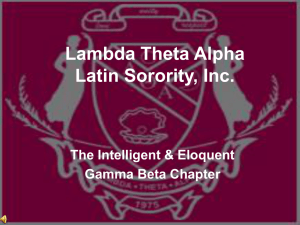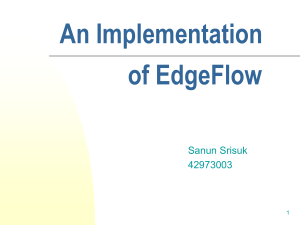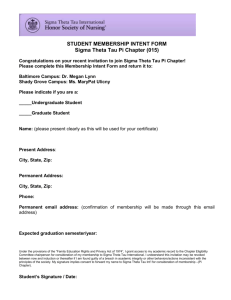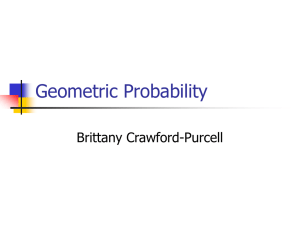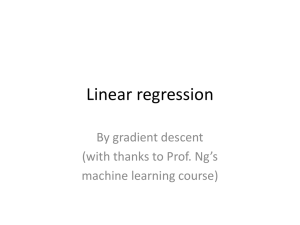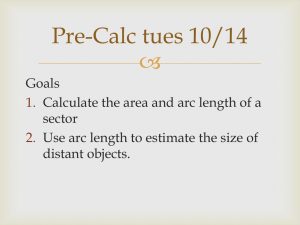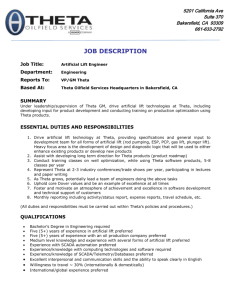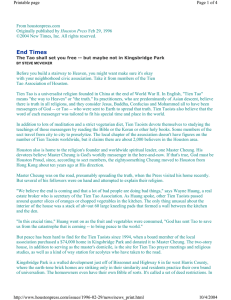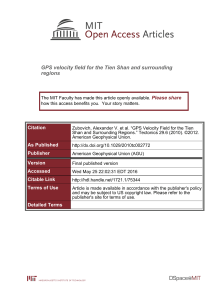Solutions - Mu Alpha Theta
advertisement
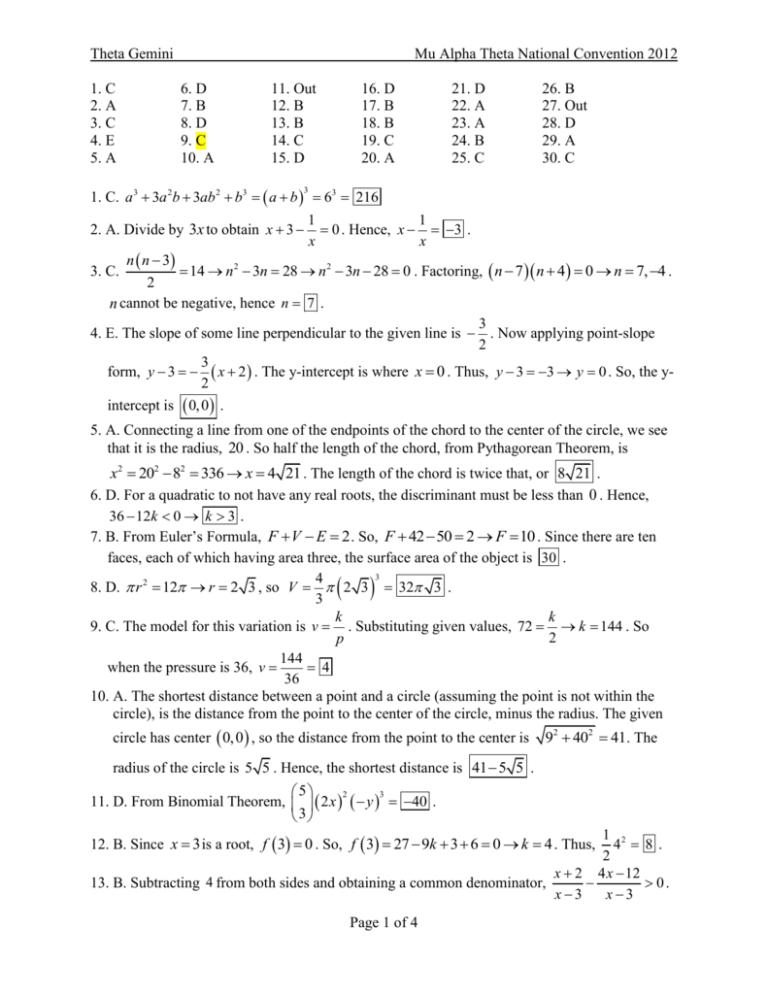
Theta Gemini 1. C 2. A 3. C 4. E 5. A Mu Alpha Theta National Convention 2012 6. D 7. B 8. D 9. C 10. A 11. Out 12. B 13. B 14. C 15. D 16. D 17. B 18. B 19. C 20. A 21. D 22. A 23. A 24. B 25. C 26. B 27. Out 28. D 29. A 30. C 1. C. a 3 3a 2b 3ab 2 b3 a b 63 216 3 2. A. Divide by 3x to obtain x 3 1 1 0 . Hence, x 3 . x x n n 3 14 n2 3n 28 n2 3n 28 0 . Factoring, n 7 n 4 0 n 7, 4 . 2 n cannot be negative, hence n 7 . 3 4. E. The slope of some line perpendicular to the given line is . Now applying point-slope 2 3 form, y 3 x 2 . The y-intercept is where x 0 . Thus, y 3 3 y 0 . So, the y2 intercept is 0, 0 . 3. C. 5. A. Connecting a line from one of the endpoints of the chord to the center of the circle, we see that it is the radius, 20 . So half the length of the chord, from Pythagorean Theorem, is x2 202 82 336 x 4 21 . The length of the chord is twice that, or 8 21 . 6. D. For a quadratic to not have any real roots, the discriminant must be less than 0 . Hence, 36 12k 0 k 3 . 7. B. From Euler’s Formula, F V E 2 . So, F 42 50 2 F 10 . Since there are ten faces, each of which having area three, the surface area of the object is 30 . 3 4 8. D. r 2 12 r 2 3 , so V 2 3 32 3 . 3 k k 9. C. The model for this variation is v . Substituting given values, 72 k 144 . So 2 p 144 4 when the pressure is 36, v 36 10. A. The shortest distance between a point and a circle (assuming the point is not within the circle), is the distance from the point to the center of the circle, minus the radius. The given circle has center 0, 0 , so the distance from the point to the center is 92 402 41. The radius of the circle is 5 5 . Hence, the shortest distance is 41 5 5 . 5 2 3 11. D. From Binomial Theorem, 2 x y 40 . 3 1 2 4 8. 2 x 2 4 x 12 0. 13. B. Subtracting 4 from both sides and obtaining a common denominator, x 3 x 3 12. B. Since x 3 is a root, f 3 0 . So, f 3 27 9k 3 6 0 k 4 . Thus, Page 1 of 4 Theta Gemini Mu Alpha Theta National Convention 2012 3 x 14 0 . Testing points below 3 , we see that all values come out negative. x3 14 14 Similarly, all values above come out negative. So, the solution interval is 3, . The 3 3 Simplifying, only integer in this interval is 4 , so there is only 1 value. 14. C. We have the parabola y ax 2 80 . Since the base points are 60 away from each other, this implies that they are each 30 away from the axis of symmetry. Thus, 0 900a 80 . So, 4 640 4 2 . a . For x 10 , the value of y is y 10 80 y 45 45 9 15. D. Adding both equations together, we have a 2 8a b 2 10b 41 . Completing the square 2 2 for both variables yields a 2 8a 16 b 2 10b 25 0 , or a 4 b 5 0 . For the sum to be 0 , both terms must be 0 . Hence, a 4, b 5 , and a b 1 . 16. D. A graph crosses the x-axis when y 0 . Setting y 0 , we have 2 log 1 x . Now there 3 are two cases. 2 Case 1: 2 log 1 3 1 1 x . Converting this to exponential form yields x x . 9 3 2 1 Case 2: 2 log 1 x . Converting this to exponential form yields x x 9 . 3 3 Hence, the graph crosses the x-axis 4 times. 1 n 1 42 17. B. After trying a few examples, it is clear that An . So, A42 , and the sum 0 1 0 1 of the entries is 44 . 18. B. The only numbers which have an odd number of positive integral divisors are perfect squares. Since we don’t want the numbers to be even, we are looking for the number of odd squares less than 1, 000 . The greatest square less than 1, 000 is 961 312 . So, the number of 31 1 16 . odd numbers less than or equal to 31 is 2 19. C. For the first triangle, 3 x 21 . For the second triangle, 63 x 2 225 . The values which satisfy this are 8, 9, 10, 11, 12, 13, and 14. So, there are 7 . b 20. A. The sum of all roots of a function is , where a is the leading coefficient, and b is the a coefficient of the term with degree one less than the leading term. Here, a 5 , and b 4 . 4 4 Hence, 5 5 Page 2 of 4 Theta Gemini Mu Alpha Theta National Convention 2012 1 21. D. To find the centroid, we simply average each coordinate. Hence, the centroid is 2, . 3 5 So, a b . 3 22. A. 8 1 2 15 2 5 1 5 5 19 12 2 4 3 2 3 4 4 20 19 23. A. Note that this triangle is right. Place the triangle on a coordinate plane with vertices 5 0, 0 , 5,0 , 0,12 . The midpoint of the hypotenuse is , 6 , and is the circumcenter. 2 5 12 13 2 . So, the incenter is 2, 2 . Hence, the distance between the The inradius is 2 2 5 65 2 . 2 2 6 2 2 24. B. Let S denote the sum. We can write out the first few terms. 2 4 6 8 10 S 0 1 2 3 4 ... 3 3 3 3 3 Dividing this sum by 3 yields: S 2 4 6 8 10 ... 3 31 32 33 34 35 Subtracting the two sums (subtract diagonally since diagonal elements will have a common denominator) yields: 2S 2 2 2 2 2 ... 3 30 31 32 33 34 The right hand side is now an infinite geometric series! So, 2S 2 9 . 3 S 3 1 1 2 3 10 10 10 10 n n 25. C. Let x 2 3 ... 10 . Because , we can rewrite this as 1 2 3 10 k nk two points is 10 10 10 10 x 2 ... 9 10 . Adding those two equations, we obtain 9 8 1 0 10 10 10 10 2 x 10 ... 10 210 . Hence, x 10 29 5120 . 10 0 1 2 Page 3 of 4 Theta Gemini Mu Alpha Theta National Convention 2012 26. B. There are different ways in which Tien can win. He can win on the first try, or he and Yamcha can both “lose” on their first try, and then Tien wins on the next roll. And so on. 2 Suppose Tien does win on the first roll. This has probability . If Tien doesn’t win on the 5 first try, and Yamcha doesn’t win on his first try, then Tien wins on the next roll, this has 3 4 2 probability . Similarly, the next situation in which Tien can win would have 5 5 5 3 4 3 4 2 probability . This goes on forever, and the probability that Tien wins is 5 5 5 5 5 the sum. So then, we see that the probability that Tien wins is actually an infinite geometri 2 3 4 12 3 4 12 c series with first term and a common ratio of . The sum, 5 5 5 25 5 5 25 2 5 10 . then, is 13 1 12 25 27. E. Consider the binary expression of n . If we were to compute the binary expression of 2n , this would just add a 0 to the end of the number. So, the number of ones stay the same, and B n B 2n . If we were to then find the binary expression of 2n 1 , this would have an extra one at the end. So, B 2n 1 B 2n 1 . Thus, B 2n 1 B n B 2n 1 B 2n 1 . 3 2 28. D. x 6 9 39 . 1 2 17 4 9 29. A. ABC is isosceles, so BAC 180 2BCA 50 . OBA OCA 90 since AB and AC are tangent. So BOC 360 OBA OCA BAC 130 . So 1 BOA BOC 65 since ABOC is a kite. 65 2 30. C. The inverse of the converse of the inverse of the contrapositive is simply the inverse of the original statement. Hence, If I like history, then I don't pass science. . Page 4 of 4
